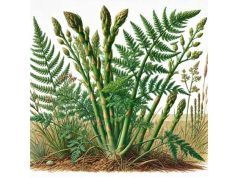
Ashwagandha (Withania somnifera), also known as Indian ginseng or winter cherry, is one of the most revered herbs in Ayurvedic medicine. Renowned for its adaptogenic properties, Ashwagandha is celebrated for helping the body combat stress, improve energy levels, and enhance overall well-being. Native to the arid regions of India, the Middle East, and parts of Africa, this powerful herb has been used for thousands of years to promote longevity and vitality. Its roots and leaves contain a diverse array of bioactive compounds—including withanolides, alkaloids, and saponins—which contribute to its anti-inflammatory, antioxidant, immunomodulatory, and neuroprotective effects.
Ashwagandha is also valued for its ability to support the endocrine system, enhance cognitive function, and improve sleep quality. As modern research increasingly validates many of its traditional uses, Ashwagandha has emerged as a popular supplement in both traditional and contemporary wellness circles. Whether used to manage stress, boost immunity, or support overall health, Ashwagandha remains a cornerstone of natural healing practices.
- potent adaptogenic properties that help reduce stress and anxiety
- Its ability to enhance energy, endurance, and physical performance
- Its anti-inflammatory and antioxidant benefits that protect against cellular damage
- Its traditional use in boosting cognitive function and improving sleep quality
- Its role in supporting endocrine and immune system balance
Table of Contents
- Ashwagandha: Botanical Profile and Characteristics
- Ashwagandha: Historical Background and Cultural Legacy
- Ashwagandha: Active Compounds and Phytochemical Composition
- Ashwagandha: Health Benefits and Therapeutic Properties
- Ashwagandha: Uses, Applications, and Safety Guidelines
- Ashwagandha: Recent Studies and Scientific Insights
- Ashwagandha: Frequently Asked Questions
Ashwagandha: Botanical Profile and Characteristics
Taxonomy and Botanical Description
Ashwagandha, scientifically known as Withania somnifera, belongs to the Solanaceae (nightshade) family. It is a small shrub that typically grows 30–150 centimeters tall. The plant is characterized by its woody stems, grey-green leaves, and bright red berries. The roots, which are the primary part used in traditional medicine, are long, tapering, and have a distinctive bitter taste. Its scientific name “somnifera” suggests a sleep-inducing quality, reflecting one of its traditional uses as a sedative.
Morphological Features
- Roots:
The roots of Ashwagandha are the most valued part of the plant, containing a high concentration of withanolides and other bioactive compounds. They are harvested after 6–8 months of growth, when the concentration of active constituents is at its peak. - Leaves:
The leaves are simple, oval to lanceolate, and covered with a fine, grayish fuzz. Although the leaves are less commonly used than the roots, they also contain beneficial compounds and are sometimes used in traditional remedies. - Berries:
Ashwagandha produces small, red, berry-like fruits that encase a single seed. While these berries are not typically used in medicinal preparations, they contribute to the plant’s overall reproductive cycle.
Growing Conditions and Cultivation
- Climate:
Native to India, Ashwagandha thrives in dry, arid climates and is well adapted to hot, sunny conditions. It is often cultivated in regions with well-drained, sandy or loamy soils. - Cultivation Practices:
Traditionally, Ashwagandha is grown in small, organic farms where natural farming methods are employed. The plant’s resilience to drought and poor soil conditions makes it an ideal candidate for sustainable agriculture. Propagation is usually done via seeds, and regular harvesting of the roots ensures a continuous supply of the active herb. - Ecological Role:
In its natural habitat, Ashwagandha contributes to soil conservation and supports local biodiversity. Its hardy nature allows it to flourish in challenging environments, where it plays a role in preventing soil erosion and providing habitat for beneficial insects.
Ashwagandha: Historical Background and Cultural Legacy
Ancient Roots and Traditional Uses
Ashwagandha has been a cornerstone of Ayurvedic medicine for over 3,000 years. Ancient texts such as the Charaka Samhita and Sushruta Samhita describe its use as a rejuvenator, stress reliever, and aphrodisiac. The herb was traditionally used to enhance physical strength, promote longevity, and maintain overall health.
- Ayurvedic Applications:
In Ayurveda, Ashwagandha is considered a powerful adaptogen, helping the body resist physical, chemical, and biological stressors. It was used to treat a wide range of conditions, including anxiety, insomnia, arthritis, and hormonal imbalances. - Traditional Preparations:
Ashwagandha was typically prepared as a decoction or ground into a powder and mixed with honey or ghee. These traditional formulations were believed to restore vitality, improve immunity, and support the nervous system.
Medieval to Modern Developments
- Historical Significance in Indian Culture:
Throughout history, Ashwagandha has been associated with vitality and vigor. It was often referred to as “Indian ginseng” due to its similar rejuvenating properties, although it is botanically distinct from true ginseng. The herb’s reputation as a remedy for stress and fatigue has been passed down through generations in Indian households. - Global Spread and Modern Research:
With the globalization of Ayurvedic practices, Ashwagandha has gained popularity worldwide. Modern scientific research is increasingly validating its traditional uses, particularly its adaptogenic, anti-inflammatory, and neuroprotective effects. As a result, Ashwagandha is now commonly incorporated into dietary supplements, herbal teas, and wellness products around the globe.
Cultural Impact
- Symbol of Vitality:
In Indian culture, Ashwagandha is revered as a symbol of strength and endurance. It is often associated with the concept of “ojas,” or vital energy, which is considered essential for a healthy and balanced life. - Modern Wellness Movement:
Today, Ashwagandha’s resurgence in the wellness industry reflects a broader trend towards natural, plant-based health solutions. Its role as an adaptogen has made it a favorite among athletes, stressed professionals, and those seeking holistic approaches to health.
The enduring legacy of Ashwagandha, from ancient Ayurvedic practices to modern integrative medicine, underscores its profound cultural and therapeutic importance. Its ability to promote vitality and balance continues to inspire both traditional herbalists and contemporary researchers.
Ashwagandha: Active Compounds and Phytochemical Composition
The impressive therapeutic potential of Ashwagandha is primarily attributed to its complex phytochemical profile. The herb’s roots contain a diverse array of bioactive constituents that work synergistically to provide its adaptogenic, anti-inflammatory, and neuroprotective effects.
Withanolides
- Core Active Constituents:
Withanolides are a group of naturally occurring steroids that are considered the primary active compounds in Ashwagandha. They have been shown to exhibit anti-inflammatory, anticancer, and neuroprotective properties. - Health Impact:
These compounds are believed to play a key role in reducing stress, enhancing cognitive function, and supporting overall hormonal balance.
Alkaloids
- Supporting Bioactivity:
In addition to withanolides, Ashwagandha contains several alkaloids, which contribute to its overall pharmacological activity. These alkaloids may help modulate the central nervous system, supporting relaxation and mental clarity.
Saponins and Flavonoids
- Antioxidant and Anti-Inflammatory Effects:
The presence of saponins and flavonoids in Ashwagandha enhances its antioxidant capacity. These compounds help neutralize free radicals, reduce oxidative stress, and lower inflammation, which is critical for maintaining cellular health and preventing chronic diseases. - Synergistic Actions:
When combined with withanolides, the saponins and flavonoids amplify Ashwagandha’s adaptogenic effects, contributing to improved energy levels and stress resilience.
Essential Nutrients
- Vitamins and Minerals:
Ashwagandha also provides trace amounts of essential vitamins (such as vitamin C and various B vitamins) and minerals (including iron, calcium, and magnesium), which support overall metabolic functions and bolster the immune system.
Synergistic Interactions
The combined action of withanolides, alkaloids, saponins, flavonoids, and essential nutrients creates a powerful synergy that underpins Ashwagandha’s diverse health benefits. This intricate blend of bioactive compounds not only contributes to its adaptogenic properties but also supports its role in promoting mental clarity, hormonal balance, and overall vitality.
Ashwagandha: Notable Health Benefits and Therapeutic Properties
Ashwagandha has been extensively used in Ayurvedic medicine for its wide-ranging therapeutic benefits. Modern scientific studies are increasingly substantiating its traditional applications, making it one of the most sought-after adaptogens in the natural health community.
1. Stress Reduction and Adaptogenic Support
- Cortisol Regulation:
Ashwagandha is renowned for its ability to modulate the body’s stress response by regulating cortisol levels. Lower cortisol levels contribute to reduced stress, anxiety, and improved mood. - Enhanced Resilience:
As an adaptogen, Ashwagandha helps the body adapt to various stressors, both physical and psychological, supporting overall mental and emotional balance.
2. Improved Energy and Physical Performance
- Boost in Vitality:
Regular use of Ashwagandha is associated with increased energy levels and improved stamina. This makes it popular among athletes and those experiencing fatigue. - Muscle Strength and Recovery:
Some studies suggest that Ashwagandha may enhance muscle strength and aid in recovery after strenuous exercise, likely due to its anti-inflammatory and antioxidant properties.
3. Cognitive Enhancement and Neuroprotection
- Memory and Focus:
Ashwagandha has been shown to improve cognitive function, including memory and concentration, which is attributed to its neuroprotective effects. It may help protect against neurodegenerative diseases and age-related cognitive decline. - Mood Stabilization:
By modulating neurotransmitter activity, Ashwagandha can help stabilize mood and reduce symptoms of anxiety and depression, promoting mental clarity and overall brain health.
4. Immune System Support
- Enhanced Immunity:
The antioxidant properties of Ashwagandha support immune function by reducing oxidative stress and inflammation. This leads to a strengthened immune response, helping the body fend off infections. - Overall Vitality:
Its adaptogenic qualities also contribute to improved overall vitality, making the herb a valuable tonic for enhancing physical and mental well-being.
5. Hormonal Balance and Reproductive Health
- Endocrine Support:
Ashwagandha plays a role in balancing hormones, particularly in the thyroid and adrenal glands. This balancing effect can help alleviate symptoms of hormonal imbalances and support reproductive health. - Aphrodisiac Properties:
Traditionally, Ashwagandha has been used as an aphrodisiac to enhance sexual vitality and performance, further emphasizing its role in supporting reproductive health.
6. Anti-Inflammatory and Antioxidant Benefits
- Cellular Protection:
The high levels of antioxidants in Ashwagandha help protect cells from oxidative damage, reducing the risk of chronic diseases and promoting longevity. - Reduction of Inflammation:
Its anti-inflammatory properties contribute to the alleviation of conditions such as arthritis, muscle soreness, and other inflammatory disorders.
7. Digestive Health and Detoxification
- Improved Digestion:
Ashwagandha is also known to support digestive health by promoting the efficient functioning of the gastrointestinal tract, enhancing nutrient absorption, and aiding in detoxification. - Liver Function:
Some traditional uses of Ashwagandha include supporting liver health, thereby facilitating the removal of toxins from the body.
Collectively, these benefits highlight Ashwagandha’s potential as a powerful adaptogen and overall health tonic. Its ability to reduce stress, enhance energy, improve cognitive function, and support hormonal balance makes it a cornerstone in both traditional Ayurvedic medicine and modern integrative health practices.
Ashwagandha: Uses, Applications, and Safety Guidelines
Culinary and Supplement Applications
- Herbal Teas and Infusions:
- Preparation:
Ashwagandha roots can be dried and ground into a powder, which is then used to brew herbal teas. Steep 1 teaspoon of the powder in boiling water for 10–15 minutes. - Usage:
Drinking one to two cups daily is a common method for harnessing its adaptogenic and anti-stress benefits.
- Dietary Supplements:
- Capsules and Powders:
Ashwagandha is widely available in capsule, tablet, and powder form. These supplements are often standardized to contain a specific percentage of withanolides, the key active compounds. - Dosage:
Typical dosages range from 300 to 600 mg per day, although this may vary depending on the formulation and individual health needs.
- Tinctures and Liquid Extracts:
- Administration:
Liquid extracts of Ashwagandha are used for faster absorption and can be taken by adding 10–20 drops to a small glass of water or juice. - Frequency:
These are often recommended 2–3 times daily for optimal stress management and energy support.
- Culinary Integration:
- Smoothies and Health Drinks:
A small amount of Ashwagandha powder can be added to smoothies, juices, or health shakes to boost their nutritional profile and impart its health benefits. - Cooking:
Although less common, Ashwagandha can be incorporated into certain recipes, particularly in traditional Ayurvedic cooking, to enhance both flavor and therapeutic properties.
Safety Guidelines and Precautions
- General Tolerance:
- Ashwagandha is generally considered safe when used in recommended doses. However, high doses may cause gastrointestinal discomfort in some individuals.
- Pregnancy and Breastfeeding:
- Pregnant and breastfeeding women should consult with a healthcare provider before using Ashwagandha supplements, as its effects on hormonal balance may require caution.
- Interactions with Medications:
- Ashwagandha may interact with certain medications, particularly those related to thyroid function, blood sugar control, and immunosuppressants. Consultation with a healthcare provider is advised if you are on prescription medications.
- Quality Assurance:
- Always purchase Ashwagandha products from reputable manufacturers who provide standardized extracts. Look for certifications of quality and purity to ensure you are getting a safe product.
- Allergic Reactions:
- Although rare, some individuals may experience allergic reactions to Ashwagandha. Discontinue use if you experience symptoms such as rash, itching, or digestive upset.
By following these guidelines and consulting with healthcare professionals when necessary, you can safely incorporate Ashwagandha into your daily regimen to reap its full spectrum of health benefits.
Ashwagandha: Recent Studies and Emerging Scientific Insights
Modern scientific research is increasingly validating the traditional uses of Ashwagandha, revealing its potential as a natural adaptogen and overall health tonic.
1. Stress and Cortisol Regulation
- Study (2018), Indian Journal of Psychological Medicine:
A randomized, double-blind study demonstrated that Ashwagandha supplementation significantly reduced cortisol levels and improved stress and anxiety symptoms in adults. This study provided robust evidence of its adaptogenic properties. - Clinical Observations (2019):
Observational studies in healthy adults have noted improvements in mood and a reduction in perceived stress after regular Ashwagandha use, supporting its historical role as a stress reliever.
2. Cognitive and Neuroprotective Effects
- Research (2020), Journal of Dietary Supplements:
Research indicates that Ashwagandha may enhance cognitive function, including memory and focus, potentially by reducing oxidative stress in the brain. Its neuroprotective effects are attributed to the antioxidant activity of withanolides. - Mechanistic Insights:
Studies are investigating how Ashwagandha modulates neurotransmitter levels and reduces neuroinflammation, which could explain its beneficial effects on cognitive health and its potential in preventing neurodegenerative disorders.
3. Anti-Inflammatory and Immune Modulation
- In Vitro Studies (2018), Phytotherapy Research:
In vitro studies have shown that Ashwagandha extracts can inhibit inflammatory cytokines and modulate immune responses. This supports its use in managing inflammatory conditions such as arthritis and metabolic syndrome. - Clinical Trials (2019):
Several small-scale clinical trials have reported improvements in inflammatory markers and overall immune function with Ashwagandha supplementation, indicating its potential as an immune-enhancing herb.
4. Energy, Endurance, and Physical Performance
- Pilot Study (2020), Journal of the International Society of Sports Nutrition:
Ashwagandha supplementation in athletes was associated with increased muscle strength, improved endurance, and enhanced recovery post-exercise. These findings underscore its potential to boost physical performance and support energy metabolism. - Metabolic Benefits:
The herb’s ability to modulate stress hormones and support mitochondrial function may contribute to improved metabolic efficiency and physical performance.
Ashwagandha: Frequently Asked Questions
Is Ashwagandha safe for daily use?
Ashwagandha is generally considered safe when taken at recommended doses. Most studies support its use as an adaptogen to reduce stress and enhance overall well-being. However, it is advisable to consult a healthcare provider before starting supplementation, especially for pregnant or breastfeeding women.
How does Ashwagandha help reduce stress?
Ashwagandha is known to modulate cortisol levels—the body’s primary stress hormone. By reducing cortisol, it helps alleviate stress, anxiety, and related symptoms, supporting a more balanced mood and improved mental clarity.
What forms of Ashwagandha are available?
Ashwagandha is available in various forms including herbal teas, powders, capsules, and liquid extracts. Homeopathic preparations are also common. The choice depends on the intended use, whether for culinary incorporation, supplementation, or topical application.
Can Ashwagandha improve cognitive function?
Emerging research suggests that Ashwagandha may have neuroprotective effects, enhancing memory and focus by reducing oxidative stress and inflammation in the brain. However, more extensive clinical trials are needed to confirm these benefits.
Disclaimer:
This article is for educational purposes only and should not be considered a substitute for professional medical advice. Always consult a qualified healthcare provider before starting any new herbal regimen, especially if you have underlying health conditions or are taking prescription medications.
If you found this comprehensive guide on Ashwagandha valuable, please share it on Facebook, X (formerly Twitter), or your preferred social media platform. Sharing this information helps others discover the natural benefits and ancient wisdom of this powerful adaptogenic herb.










